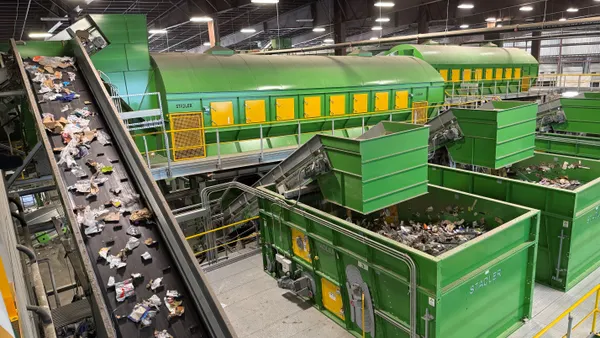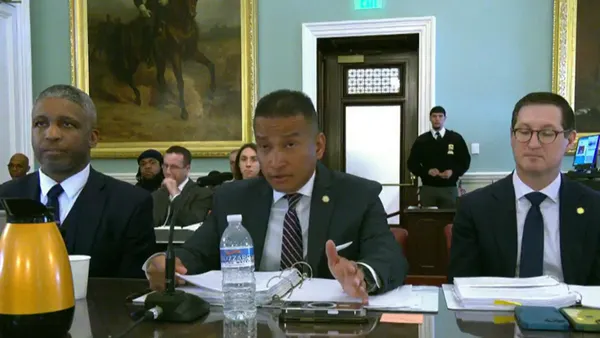Editor's note: Waste Dive breaks down the recent findings and recommendations out of NYCOSH's study on the city's private waste industry. This story will continue to be developed
The New York Committee for Occupational Safety and Health (NYCOSH) has released a new report of 8 case studies that highlight how NYC private waste sector employers have allegedly violated various legal requirements, leading to injuries and fatalities.
NYCOSH's report is the latest in a trending series of reports being fired out by groups studying ways to change NYC's commercial waste collection system. In April, Transform Don't Trash NYC released a study that found other concerns related to the performance of private companies, mainly highlighting inefficiencies in the routes that commercial haulers take on a nightly basis.
The report revealed these key issues:
- waste operations tend to be less safe when conducted by commercial operators than local government agencies.
- many commercial waste operators routinely violate OSHA requirements and wage and hour laws.
- hazards from commercial waste violations have a ripple effect on public health.
- many commercial waste operations with records of violations are still allowed to continue business.
And NYCOSH offers these policy recommendations, including:
- initiating criminal prosecution for waste operators when there is evidence of purposeful disregard of legal requirements, resulting in fatalities
- requiring compaction vehicles to be equipped with neutral position interlocks
- removing riding steps from waste collection vehicles
- and conducting public education campaigns among consumers to practice source separation
While NYCOSH's report focuses on safety, many industry stakeholders including SWANA and NWRA point out that they have been working to ensure that safety precautions are already being taken in the public and private sectors.
"Safety is not only a priority for us, but for our member companies. Companies who are our members are with us because they believe and they uphold our mission and our vision to ensure that we bring our workers all home safely to their families every night," said Jessica Mayorga of NWRA.
"The thing that we do is, whenever members reach out to us needing specific information that'll help them build out a better, more robust safety program, we have the materials to enable them and we can partner with them," Tony Hargis, NWRA's national safety director said. "The material we have available really addresses a lot of the issues that were brought up in this report that specifically tried to cite that there are hazards and controls that need to be managed in this industry in New York ... All of those issues are regulatory requirements. There's not a single one of them that the federal, state, or local government doesn't require."
SWANA CEO David Biderman also expressed that, despite representing the public sector, the association is working toward expanding safety across the industry as a whole. NWRA will partner with SWANA, as well as the Business Integrity Commission, to host a half-day NYC Safety Symposium for waste and recycling on June 16, calling representatives from the entire industry to come together and discuss safety.
"SWANA is expanding its safety program for many of the reasons identified in the NYCOSH report—because too many workers are getting killed or hurt on the job," said Biderman.
NYCOSH, eager to see a more rapid change among commercial waste employers, addressed best practices for commercial employers, including:
- limiting extended work shifts
- conducting hazard assessments in workplaces
- providing health and safety training to workers
- complying with wage and hour laws
- and establishing blood/bodily fluid exposure control plans
"Too many workers are getting injured or killed in the commercial waste industry as egregious violators disregard workplace safety. New York City needs to ensure that employers are held accountable to the law and get creative about solutions to keeping these workers—who are primarily people of color—safe," said NYCOSH Executive Director Charlene Obernauer, as reported in WorkersCompensation.com.














